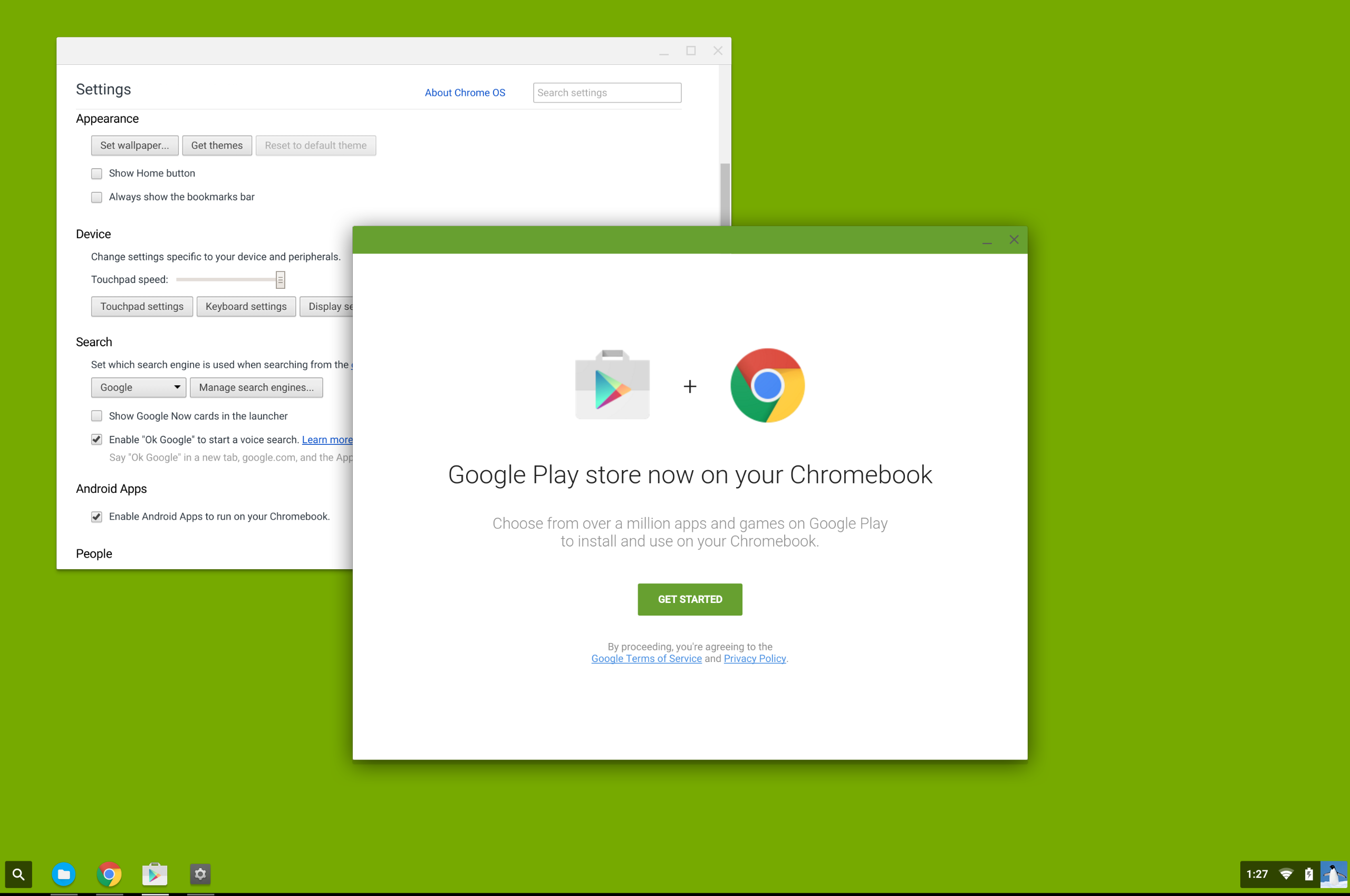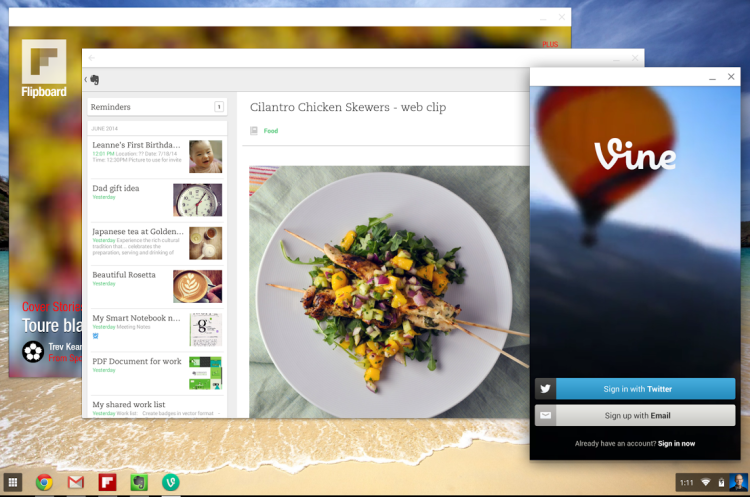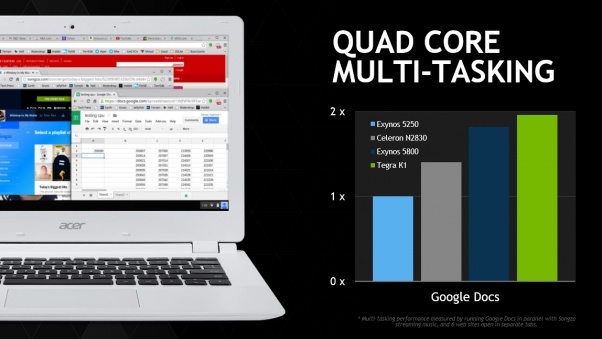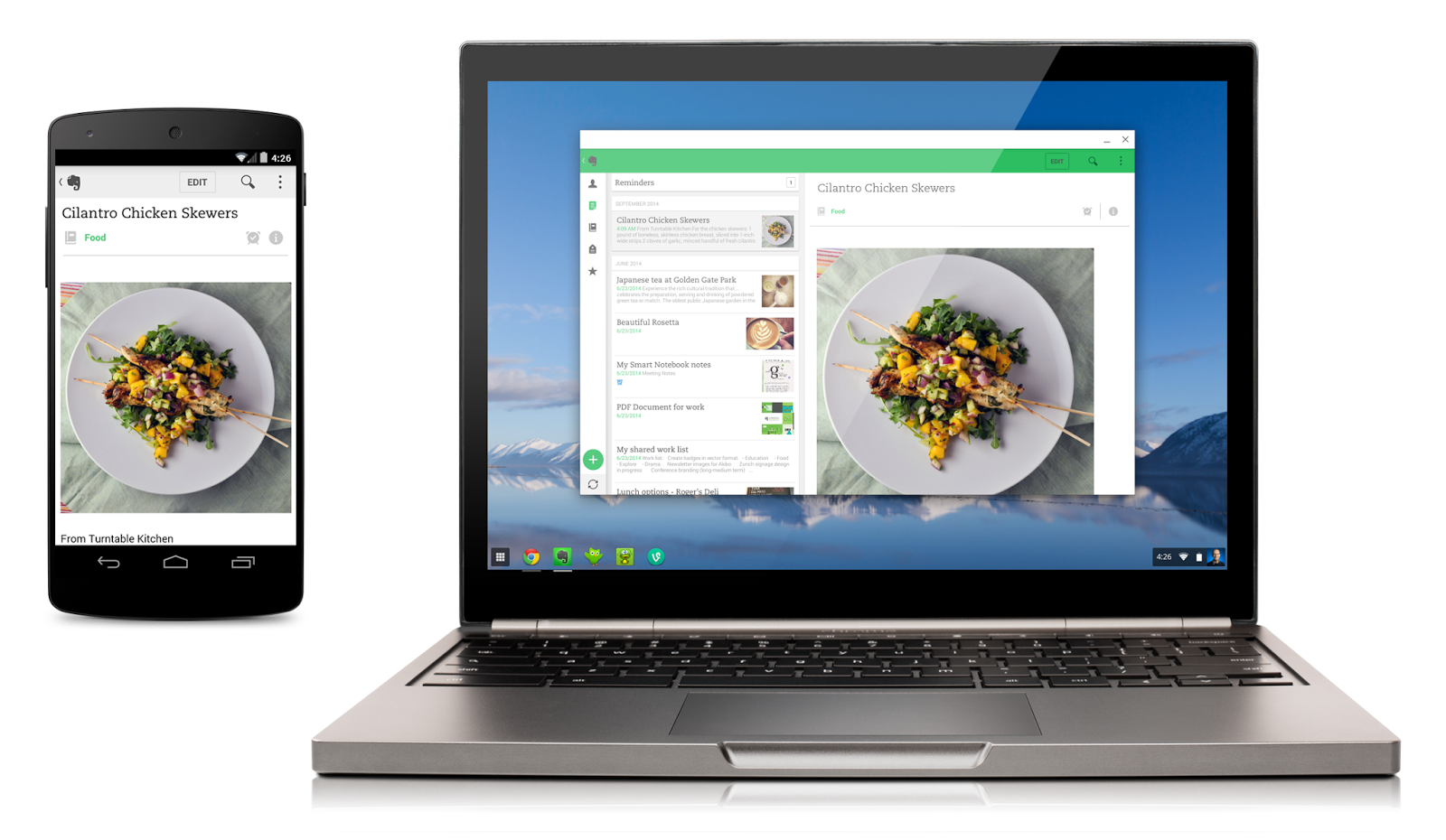Chromebooks With Google Play Store Integration Could Be First Mass-Market Alternative To Windows PCs
Some Reddit users found a few lines of code in the Chrome OS source code that show support for the Android Play Store, which has over one million applications. This could make Chrome OS the first mass-market alternative to Windows PCs.
Google announced support for Android apps on Chrome OS two years ago at its Google I/O event, but the “ARC” (App Runtime for Chrome) system needed to make this happen was still experimental, so only a few Android apps worked on Chrome OS at the time.
It was also not clear how much developers would have to modify their apps to work on Chrome OS. Google said back then that it shouldn’t take too much work to port the apps. However, at the same time, it was rather clear that Google was partnering with only a handful of developers, hinting that it wasn’t something that just anyone could do.
A Million Apps Coming To Chrome OS
If the full Play Store comes to Chrome OS, then we’ll probably see more than a few Android apps working on Chrome OS, soon. In the Chrome OS source code (line 6544), there were a few lines of code containing the following message:
<message name="IDS_ARC_OPT_IN_DIALOG_DESCRIPTION" desc="Description of the opt-in dialog for Android apps.">Choose from over a million apps and games on Google Play to install and use on your <ph name="DEVICE_TYPE">$1<ex>Chromebook</ex></ph>.</message>
The message seems to imply that most Android apps should work without further modifications from developers, but we won’t know how true that is until Google confirms it, possibly at the next Google I/O. We do know from the same message that so far, users need to opt-in to using Android apps.
This may be a user experience decision, if Google thinks most people would still be content with just the current stripped-down, web-centric Chrome OS experience. However, it could also be a security decision. Web apps can do less harm than native apps, and if Chrome OS borrows much of the Android framework to make those apps work, it’s possible that will significantly increase its attack surface significantly. However, it may still remain more secure than a typical Android device.
Get Tom's Hardware's best news and in-depth reviews, straight to your inbox.
Chromebooks are already quite popular in the educational sector, and they're becoming even more popular every day. Schools may not want to give their students access to all Android apps, so they may disable them by default across all of their Chromebooks. Google could also implement certain management features to allow only certain apps to be installed, as it has already done for its Android tablets for schools.
Chrome OS, A “Full” Operating System
Chrome OS has received much criticism since its early days for not being a “full operating system” and lacking native applications. This may now change, which could make Chrome OS a more serious competitor than it has been in the PC market.
Chrome OS may still not have too many “PC-centric” applications at first, even with the Play Store integration enabled, but those types of apps will eventually come if Chromebooks see a surge in sales. Until then, users could benefit from an operating system that has great performance even on lower-end hardware.
Various Android apps can still be put to good use, such as photo editing tools, Microsoft Office, chat applications (including Skype, which didn’t work on Chrome OS before), and even some games.
As Google enables Vulkan for Android soon, we may see more graphics-intensive ports of console or PC games on Chrome OS, as well. Many ports that have been tried before on tablets suffered not just from the lower performance, but mainly from forcing the players to use touch controls for a game that was optimized or a mouse or a physical controller.
Chrome OS Needs Longer Support Time
Chrome OS has great support in terms of receiving frequent updates, but those don’t last that long. Google pledged only five years of support for any given Chromebook. Windows tends to get updates for a decade, and even when support for a given version of an OS is over, users could install the new version of Windows to further expand the life of their devices.
Extending the lifetime to at least seven years to ensure nobody gets left behind, even if they use their devices for longer than five years, would make Chromebooks much more appealing for consumers. Enterprise customers would also become more interested in Chromebooks, because many companies tend to replace their hardware on a slower cadence than five years.
Enabling Stronger Chip Competition
One of the first Chromebooks, and one of the most popular as well, was Samsung's first ARM-based Chromebook from 2011. The machine showed that Chrome OS can run well on mobile chips, but it also showed that ARM chips were becoming powerful enough for a notebook. However, two years later, Google partnered with Intel to release new Chromebooks based on a Haswell Celeron chip. Because it was a Haswell microarchitecture chip (just with lower clock speed than Core i3 or Core i5), it was significantly more powerful than an ARM chip. From that point on, most people wanted Intel-based Chromebooks.
However, shortly thereafter, Intel switched the Haswell-based Celerons it would put in Chromebooks to Atom-based Celerons. Because Atom was a mobile chip, its performance was much more in line with that of an ARM chip, but because of Intel's popularity and the first good reviews of the Haswell Celeron Chromebooks, Intel-based Chromebook remained popular.
Now, the vast majority of new Chromebooks come only with Intel chips, even though the low-end ones have at best equal performance to ARM chips. With AMD not even in the Chromebook market, most chip competition in nil. Now, Intel seems to be the de facto chip maker chosen by Chromebook OEMs.
If it wanted, Google could encourage PC manufacturers (especially those who also make Android devices) to adopt more ARM chips in their Chromebooks. Android apps are already well optimized for ARM chips, so bringing them to Chromebooks seems like a perfect opportunity for Google to bring more chip competition into the notebook market. Microsoft tried to do it with Windows RT, but (in part) because of a dearth of apps, the whole package just wasn’t quite attractive to consumers.
Chrome OS doesn’t have this issue, because it has mostly web apps, and now it gets Android apps, neither of which are tied to a specific chip architecture the way Windows and its legacy apps are. Microsoft is now encouraging developers to package their legacy apps into Universal Apps, too, but it may still take a long time before most users are comfortable with using ARM-based Windows machines again.
Because Chromebooks don’t have this limitation, customers should be able to choose more ARM-based machines, too. For budget notebooks, the latest ARM chips should equal or even exceed the latest Atom-based Celerons or Pentiums from Intel. Games or other apps that use native code may even work better on ARM hardware, as well.
Chromebooks And Android In Emerging Markets
In many emerging markets, especially in places like Africa, India, and even China, many people use Android devices as their first computers. For them, a Chromebook with Android apps would be a natural evolution, rather than something to which they’d have to switch from Windows or Mac OS X. In such places, and with cheap (but powerful enough) ARM hardware, Chromebooks could do especially well, much like Android smartphones have done.
It's still not quite clear why Google wouldn't just take Android and optimize it for PCs, which is what Jide has done with Remix OS, but it may be because Google has already invested significant amounts of money in not just developing, but also promoting Chromebooks. All of that money and effort may go to waste if it decides to make a PC-optimized version of Android.
What remains to be seen is whether Chrome OS actually gives Android apps any security advantage, and whether their performance will be significantly impacted while running within Chrome OS. These are some of the questions that we hope the company will answer at the next Google I/O.
Lucian Armasu is a Contributing Writer for Tom's Hardware. You can follow him at @lucian_armasu.
Lucian Armasu is a Contributing Writer for Tom's Hardware US. He covers software news and the issues surrounding privacy and security.
-
gravewax A million apps, but 999,000 of them are complete garbage. It is not the number of apps that is Chromes problem, it is the quality of them, especially in the business arena, combined with a subpar OS this really doesn't make it a viable alternative at all.Reply -
Simonatsydney I love chromebook! It is so simple to use (within its limits) I hope it never gets too complicated. BTW I am a computer programmer - I like computers...Reply -
pgunn01 I'm very happy with ChromeOS, but adding a few of the Android apps I use on my phone and tablet would be pretty great. Contrary to gravewax, the percentage of apps in the store that are good doesn't matter to me; I'm not going to install even 1000 apps, just the ones I like now and maybe the ones that later interest me.Reply -
pgunn01 I'm very happy with ChromeOS, but adding a few of the Android apps I use on my phone and tablet would be pretty great. Contrary to gravewax, the percentage of apps in the store that are good doesn't matter to me; I'm not going to install even 1000 apps, just the ones I like now and maybe the ones that later interest me.Reply -
modbus ReplyA million apps, but 999,000 of them are complete garbage. It is not the number of apps that is Chromes problem, it is the quality of them, especially in the business arena, combined with a subpar OS this really doesn't make it a viable alternative at all.
Agreed with what you say about most apps being garbage but then again so is most software. Chromebook is already a viable alternative to Windows PCs. 90% (probably even more) of people don't need the power of a windows or apple PC. All most people do with their computers are Netflix / Youtube / {insert social media here} and MS Office. My GF needed a new laptop for college and was looking at apples (she went into a store and the sales guy got it in her head) I bought her a Chromebook and she loves it, she does have problems with MS Word documents but that will be solved once the play store is available. I also convinced both my parents to buy one and they don't even notice the difference between their old windows PCs and their new Chromebooks. -
Onus So, you can send your computer usage data to Microsoft, whose core business is not advertising, or you can send it to Google, which would love to sell your information to advertisers.Reply
Decisions, decisions...
-
targetdrone So Chromebooks get OS updates for 5 years(after model release) yet Android is maybe 18 months of support, if you shelled out almost G for the flashship model from a major manufacture and if you're lucky to be with a carrier that actually updates their devices?Reply -
hannibal Chrome os upgrades comes directly From Google. Android upgrades come From phone makers and carriers, so there Are two extra Walls in between Google and customers, who Are not so keen on upgrading old devices and hope that people will buy new phone instead of upgrading the os...Reply
-
zodiacfml I feel bad for Google. I really don't know why they created the Chrome OS. I think it was a victim of its own success as they probably they didn't expect the larger and better reception for the Chrome OS.Reply



